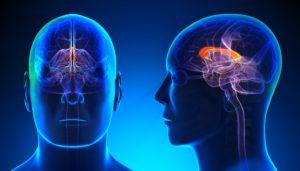© 2017, GENASSIST, Inc.
By Keith S. Wexler, MBA, Maternal Fetal Medicine, Prenatal Diagnosis and Biotech/Life Sciences Consultant, GENASSIST, Inc.
Paul Wexler, M.D., F.A.C.O.G., Medical Director, GENASSIST, Inc.
Clinical Professor, Department of OB/GYN, University of Colorado Health Sciences Center
Clinical Professor, Division of Genetics/Dept. of Pediatrics, Univ. of Colorado/The Children’s Hospital
Agenesis of the Corpus Callosum (ACC) is when the corpus callosum that connects both hemispheres of the brain in a fetus only partially develops or does not develop (agenesis) in pregnancy.
Agenesis of the Corpus Callosum Symptoms:
- Low muscle tone
- Vision and hearing difficulties
- Variable developmental delay
- Swallowing and feeding difficulties
- Occasional seizures
Incidence: 1-7 per 1000 births
Agenesis of the Corpus Callosum can be inherited in an autosomal recessive manner, X linked dominant inheritance or be due to a new mutation in the fetus or can also be attributed to an infection or excessive alcohol consumption in pregnancy.
Autosomal recessive diseases are due to a child inheriting one deleterious gene from each parent. That couple’s recurrence risk for another child with Agenesis of the Corpus Callosum could approach 25% (1 in 4).
X linked dominant inheritance is due to the inheritance of one deleterious gene on one X chromosome from an affected parent, or can be due to a new mutation (de novo).
Several gene mutations have been implicated in the disorder:
- Mutation in the SLC12A6 gene on the short arm of chromosome #15 (15q13-14)
- ARX gene on the short arm of the X chromosome (Xp22.13)
- SZT2 mutations on the short arm of chromosome #1 (1p34.2) and may be associated with seizures
- DCC mutations on the long arm of chromosome #18 (18q21.3)
Several genetic companies are offering panels for mutational analysis for children with Agenesis of the Corpus Callosum.
Most Pediatric Neurologists are aware of this testing. However, not all cases will be diagnosed by these genetic tests.
